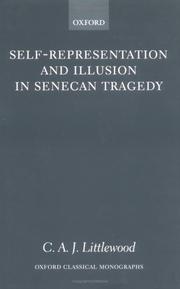| Listing 1 - 1 of 1 |
Sort by
|

ISBN: 0199267618 0191708356 Year: 2004 Volume: *26
Abstract | Keywords | Export | Availability | Bookmark
 Loading...
Loading...Choose an application
- Reference Manager
- EndNote
- RefWorks (Direct export to RefWorks)
C. A. J. Littlewood approaches Seneca's tragedies as Neronian literature rather than as reworkings of Attic drama, and emphasizes their place in the Roman world and in the Latin literary corpus. The Greek tragic myths are for Seneca mediated by non-dramatic Augustan literature. In literary terms Phaedra's desire, Hippolytus' innocence, and Hercules' ambivalent heroism look back through allusion to Roman elegy, pastoral, and epic respectively. Ethically, the artificiality of Senecan tragedy, the consciousness that its own dramatic worlds, events, and people are literary constructs, responds to the contemporary Stoical dismissal of the public world as mere theatre.
Auto présentation dans la littérature --- Auto-présentation dans la littérature --- Illusie in de literatuur --- Illusion dans la littérature --- Illusion in literature --- Mythologie [Klassieke ] in de literatuur --- Mythologie classique dans la littérature --- Mythology [Classical ] in literature --- Self presentation in literature --- Self-presentation in literature --- Tragedie --- Tragedy --- Tragédie --- Treurspel --- Zelfpresentatie in de literatuur --- Seneca, Lucius Annaeus, --- Illusion in literature. --- Mythology, Classical, in literature. --- Self-presentation in literature. --- Tragedy. --- Nero, --- Influence. --- Tragedies. --- Mythology, Classical, in literature --- Drama --- Seneca, Lucius Annaeus --- Sénèque --- Néron, --- Nerone, --- Nīrūn, --- Seneca --- Tragedies --- Nero --- Influence --- Greek & Latin Languages & Literatures --- Languages & Literatures --- Criticism and interpretation. --- Annaeus Seneca, Lucius, --- Seneca, Annaeus, --- Seneca, --- Seneca, L. A. --- Seneca, Lucio Anneo, --- Seneka, --- Seneka, L. Annėĭ, --- Sénèque, --- סנקא, לוציוס אנאוס --- Pseudo-Seneca --- Seneque (lucius annaeus seneca), 4 av.j-c.-65 ap.j-c. --- Perception de soi --- Critique et interpretation --- Dans la litterature
| Listing 1 - 1 of 1 |
Sort by
|

 Search
Search Feedback
Feedback About UniCat
About UniCat  Help
Help News
News